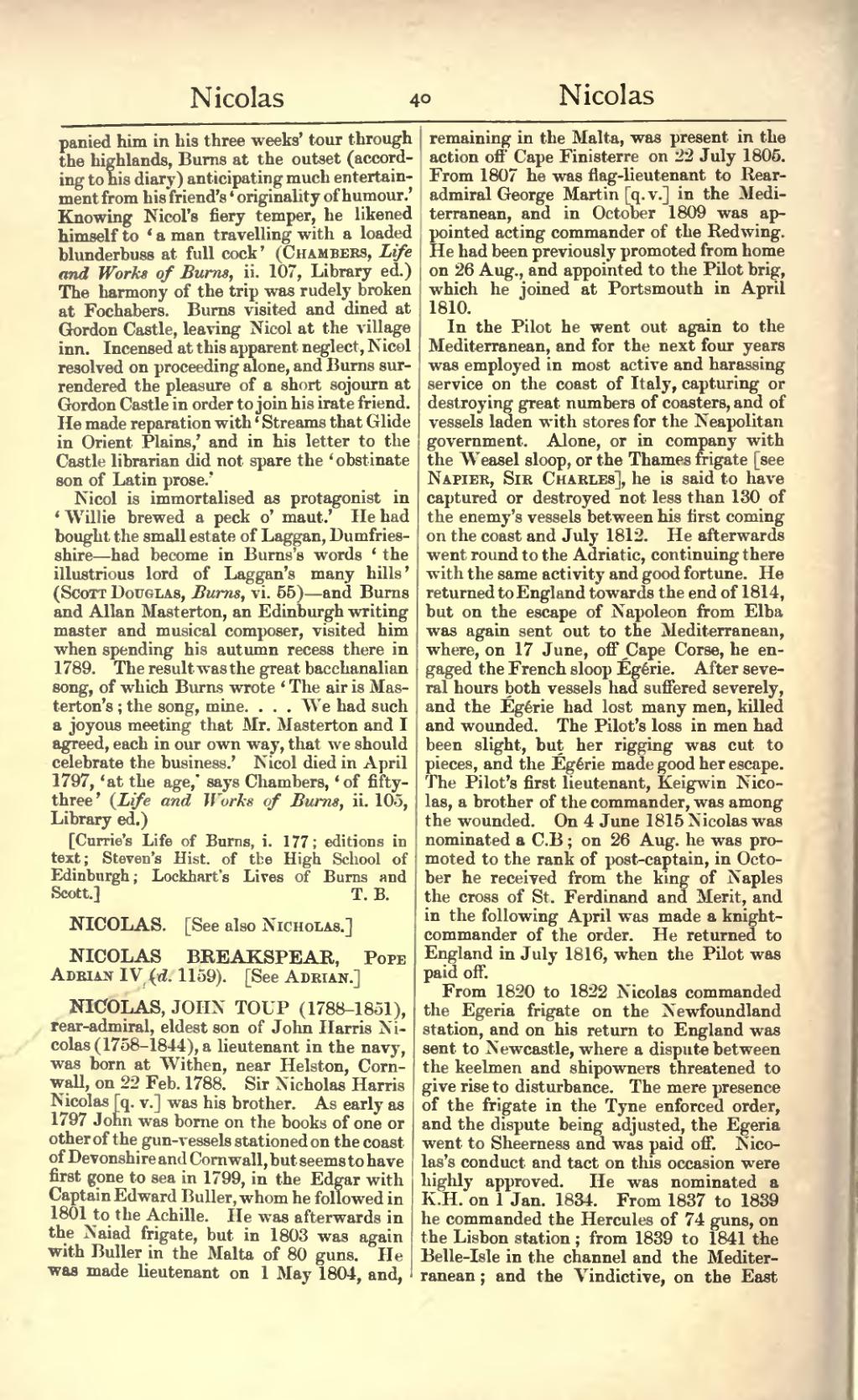panied him in his three weeks' tour through the highlands, Burns at the outset (according to his diary) anticipating much entertainment from his friend's ‘originality of humour.’ Knowing Nicol's fiery temper, he likened himself to ‘a man travelling with a loaded blunderbuss at full cock’ (Chambers, Life and Works of Burns, ii. 107, Library ed.) The harmony of the trip was rudely broken at Fochabers. Burns visited and dined at Gordon Castle, leaving Nicol at the village inn. Incensed at this apparent neglect, Nicol resolved on proceeding alone, and Burns surrendered the pleasure of a short sojourn at Gordon Castle in order to join his irate friend. He made reparation with ‘Streams that Glide in Orient Plains,’ and in his letter to the Castle librarian did not spare the ‘obstinate son of Latin prose.’
Nicol is immortalised as protagonist in ‘Willie brewed a peck o' maut.’ He had bought the small estate of Laggan, Dumfriesshire—had become in Burns's words ‘the illustrious lord of Laggan's many hills’ (Scott Douglas, Burns, vi. 55)—and Burns and Allan Masterton, an Edinburgh writing master and musical composer, visited him when spending his autumn recess there in 1789. The result was the great bacchanalian song, of which Burns wrote ‘The air is Masterton's; the song, mine. … We had such a joyous meeting that Mr. Masterton and I agreed, each in our own way, that we should celebrate the business.’ Nicol died in April 1797, ‘at the age,’ says Chambers, ‘of fifty-three’ (Life and Works of Burns, ii. 105, Library ed.)
[Currie's Life of Burns, i. 177; editions in text; Steven's Hist. of the High School of Edinburgh; Lockhart's Lives of Burns and Scott.]
NICOLAS. [See also Nicholas.]
NICOLAS BREAKSPEAR. Pope Adrian IV (d. 1159). [See Adrian.]
NICOLAS, JOHN TOUP (1788–1851), rear-admiral, eldest son of John Harris Nicolas (1758–1844), a lieutenant in the navy, was born at Withen, near Helston, Cornwall, on 22 Feb. 1788. Sir Nicholas Harris Nicolas [q. v.] was his brother. As early as 1797 John was borne on the books of one or other of the gun-vessels stationed on the coast of Devonshire and Cornwall, but seems to have first gone to sea in 1799, in the Edgar with Captain Edward Buller, whom he followed in 1801 to the Achille. He was afterwards in the Naiad frigate, but in 1803 was again with Buller in the Malta of 80 guns. He was made lieutenant on 1 May 1804, and, remaining in the Malta, was present in the action off Cape Finisterre on 22 July 1805. From 1807 he was flag-lieutenant to Rear-admiral George Martin [q. v.] in the Mediterranean, and in October 1809 was appointed acting commander of the Redwing. He had been previously promoted from home on 26 Aug., and appointed to the Pilot brig, which he joined at Portsmouth in April 1810.
In the Pilot he went out again to the Mediterranean, and for the next four years was employed in most active and harassing service on the coast of Italy, capturing or destroying great numbers of coasters, and of vessels laden with stores for the Neapolitan government. Alone, or in company with the Weasel sloop, or the Thames frigate [see Napier, Sir Charles], he is said to have captured or destroyed not less than 130 of the enemy's vessels between his first coming on the coast and July 1812. He afterwards went round to the Adriatic, continuing there with the same activity and good fortune. He returned to England towards the end of 1814, but on the escape of Napoleon from Elba was again sent out to the Mediterranean, where, on 17 June, off Cape Corse, he engaged the French sloop Égérie. After several hours both vessels had suffered severely, and the Égérie had lost many men, killed and wounded. The Pilot's loss in men had been slight, but her rigging was cut to pieces, and the Égérie made good her escape. The Pilot's first lieutenant, Keigwin Nicolas, a brother of the commander, was among the wounded. On 4 June 1815 Nicolas was nominated a C.B.; on 26 Aug. he was promoted to the rank of post-captain, in October he received from the king of Naples the cross of St. Ferdinand and Merit, and in the following April was made a knight-commander of the order. He returned to England in July 1816, when the Pilot was paid off.
From 1820 to 1822 Nicolas commanded the Egeria frigate on the Newfoundland station, and on his return to England was sent to Newcastle, where a dispute between the keelmen and shipowners threatened to give rise to disturbance. The mere presence of the frigate in the Tyne enforced order, and the dispute being adjusted, the Egeria went to Sheerness and was paid off. Nicolas's conduct and tact on this occasion were highly approved. He was nominated a K.H. on 1 Jan. 1834. From 1837 to 1839 he commanded the Hercules of 74 guns, on the Lisbon station; from 1839 to 1841 the Belle-Isle in the channel and the Mediterranean; and the Vindictive, on the East
